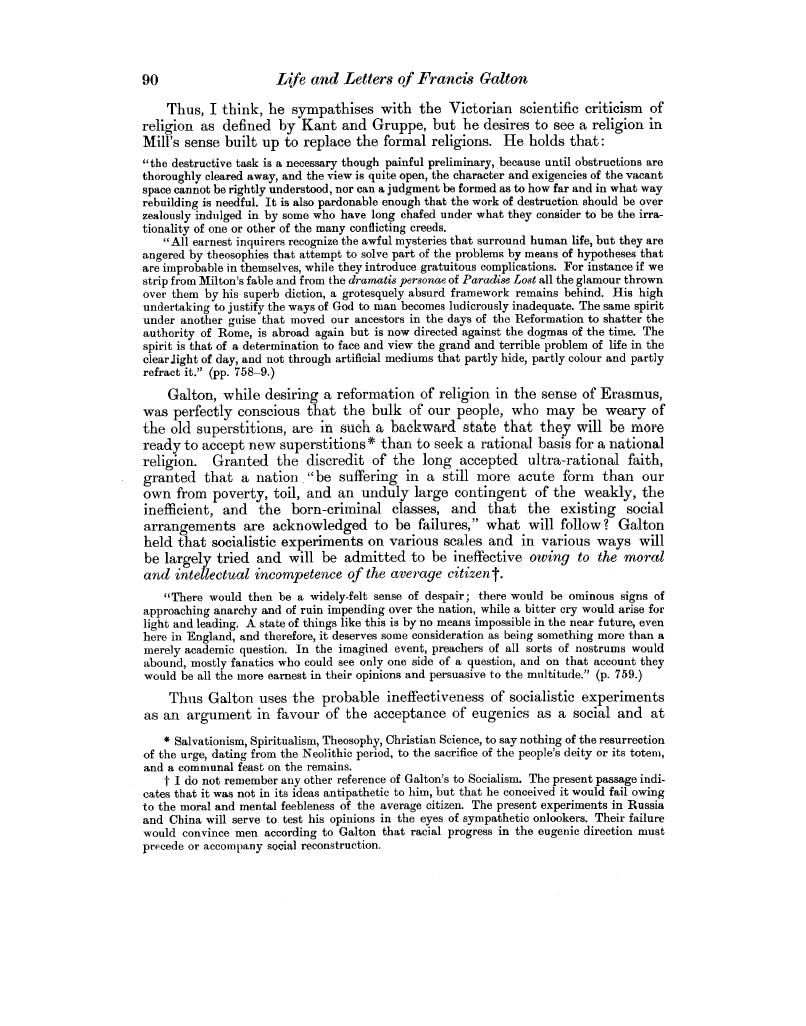| ||||||

OCR Rendition - approximate
90 Life and Letters of Francis Galton Thus, I think, he sympathises with the Victorian scientific criticism of religion as defined by Kant and Gruppe, but he desires to see a religion in Mill's sense built up to replace the formal religions. He holds that "the destructive task is a necessary though painful preliminary, because until obstructions are thoroughly cleared away, and the view is quite open, the character and exigencies of the vacant space cannot be rightly understood, nor can a judgment be formed as to how far and in what way rebuilding is needful. It is also pardonable enough that the work of destruction should be over zealously indulged in by some who have long chafed under what they consider to be the irrationality of one or other of the many conflicting creeds. "All earnest inquirers recognize the awful mysteries that surround human life, but they are angered by theosophies that attempt to solve part of the problems by means of hypotheses that are improbable in themselves, while they introduce gratuitous complications. For instance if we strip from Milton's fable and from the dramatis personae of Paradise Lost all the glamour thrown over them by his superb diction, a grotesquely absurd framework remains behind. His high undertaking to justify the ways of God to man becomes ludicrously inadequate. The same spirit under another guise that moved our ancestors in the days of the Reformation to shatter the authority of Rome, is abroad again but is now directed against the dogmas of the time. The spirit is that of a determination to face and view the grand and terrible problem of life in the clearlight of day, and not through artificial mediums that partly hide, partly colour and partly refract it." (pp. 758-9.) Galton, while desiring a reformation of religion in the sense of Erasmus, was perfectly conscious that the bulk of our people, who may be weary of the old superstitions, are in such a backward state that they will be more ready to accept new superstitions* than to seek a rational basis for a national religion. Granted the discredit of the long accepted ultra-rational faith, granted that a nation. "be suffering in a still more acute form than our own from poverty, toil, and an unduly large contingent of the weakly, the inefficient, and the born-criminal classes, and that the existing social arrangements are acknowledged to be failures," what will follow? Galton held that socialistic experiments on various scales and in various ways will be largely tried and will be admitted to be ineffective owing to the moral and intellectual incompetence of the average citizen j-. "There would then be a widely-felt sense of despair; there would be ominous signs of approaching anarchy and of ruin impending over the nation, while a bitter cry would arise for light and leading. A state of things like this is by no means impossible in the near future, even here in England, and therefore, it deserves some consideration as being something more than a merely academic question. In the imagined event, preachers of all sorts of nostrums would abound, mostly fanatics who could see only one side of a question, and on that account they would be all the more earnest in their opinions and persuasive to the multitude." (p. 759.) Thus Galton uses the probable ineffectiveness of socialistic experiments as an argument in favour of the acceptance of eugenics as a social and at * Salvationism, Spiritualism, Theosophy, Christian Science, to say nothing of the resurrection of the urge, dating from the Neolithic period, to the sacrifice of the people's deity or its totem, and a communal feast on the remains. t I do not remember any other reference of Galton's to Socialism. The present passage indicates that it was not in its ideas antipathetic to him, but that he conceived it would fail owing to the moral and mental feebleness of the average citizen. The present experiments in Russia and China will serve to test his opinions in the eyes of sympathetic onlookers. Their failure would convince men according to Galton that racial progress in the eugenic direction must precede or accompany social reconstruction.
|